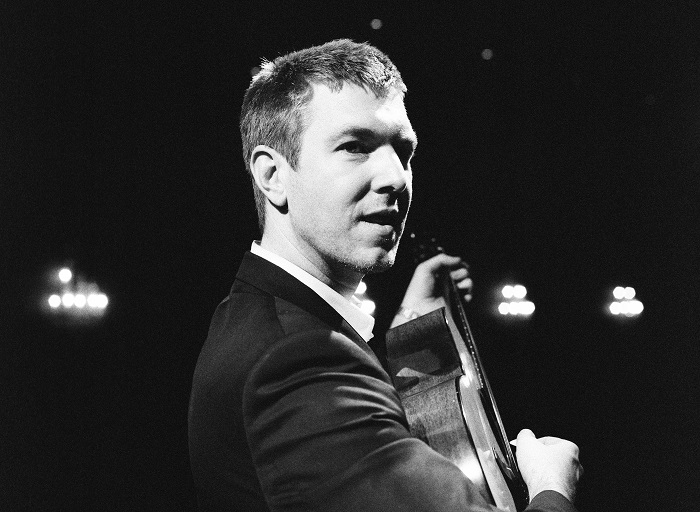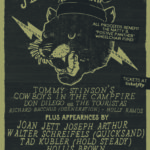
By Jamie Frey
[A]s the lead singer of the Walkmen, Hamilton Leithauser has been churning out solid indie rock records since the early 2000s. These days, however, he’s been on a new journey as a solo artist, releasing his debut, Black Hours, last year and a new single, “Room For Forgiveness,” in November. A collection of loungey, cinematic pop reminiscent of Leonard Cohen’s Death Of A Ladies’ Man, Black Hours also features quite a cast of collaborators, including Rostam Batmanglij of Vampire Weekend (with whom he has more material in the works), Morgan Henderson of Fleet Foxes, Richard Swift of the Shins, Amber Coffman of Dirty Projectors, and Walkmen guitarist/pianist Paul Maroon. Recorded at Vox Studios in Los Angeles—which has hosted the likes of Johnny Mercer and Bing Crosby—Black Hours is a classy affair that demonstrates the breadth of Leithauser’s vocal and songwriting abilities.
Now on the eve of his most recent run of tour dates for Black Hours (starting January 15 at Pittsburgh’s Club Café and ending January 30 at New York’s Bowery Ballroom—see full list here, featuring first-rate openers like Bully), Leithauser finds himself on exciting new ground…
EM: Black Hours is your first solo record, amid a 14-year career with the Walkmen in which you guys have really stuck it out and continued to make records when a lot of other bands haven’t. How do you feel about the Walkmen now?
HL: I’m proud of the Walkmen; they’re my good friends and I’m really proud that we stuck with it for so long because it was not always easy for us. We had some tough times and we stuck it out for a really long time.
EM: Paul Maroon wrote some of the stuff on the record. How did that work?
HL: By the time the Walkmen had discussed not working together anymore, he and I had all this stuff we were working on, because he and I always write music. He lived in New Orleans at the time and I lived in New York, and our system we had been doing in the Walkmen for all these years involved a lot of doing something on your own and then e-mailing it to the other. The other guy would hear it and we’d finally get together after a period of months. So he and I had kept that up after Heaven [the last album by the Walkmen, released in 2012], just sending a few ideas here and there and we hadn’t ever gotten the band together for practice. But I guess maybe right at the time where it would have been time to do that was when we realized like, “I don’t really wanna get the band together right now.” I wanted to keep working on music and I didn’t wanna just throw away that stuff I had been working on with Paul just because it was a little bit awkward—because it was at first. We were gonna go our separate ways but stick together, but I think everybody understood that we had a lot of stuff underway and we wanted to see it through. But I was also working on stuff myself and I started working with Rostam. It’s a very different situation now.

EM: The personnel list for Black Hours is interesting because the Walkmen have been making records since the early 2000s and on this album you have a supergroup lineup of that certain generation. Is working with musicians in your peer group something you seek to do?
HL: Yeah, it’s really great working with new people. I was really lucky to find Rostam, or he found me, but I was lucky that it worked out. I can’t imagine the situation where I find another songwriter that I really wanna work with ’cause you gotta really know each other well and you gotta come from a really similar direction. It’s like a friendship. I’ve always been really tight with the guys in the band. I’ve known ’em since I was a kid so I can’t imagine finding another person to write with, but if it happened again, I’d be pleasantly surprised. I like working with other people. I do so much stuff alone that it’s fun for me to get together with other people. It’s like a treat.
EM: Now that you’re going solo, are there other artists whose solo moves you want to emulate? Like, “I could be a Lou Reed-type solo guy or a Stephen Malkmus-type solo guy…?”
HL: It is funny, I sort of started to see how it works with certain people. The first thing I noticed is that people don’t know your name, as much as people know the Walkmen. Like, big time. It’s more than I expected—people who love the Walkmen have no idea who I am.
EM: Is that freeing to you a little? Do you feel like a free man?
HL: It’s scary, yeah, but it was what I was asking for. Starting over is funny: you’re the opening act. Sometimes it feels like the Walkmen never happened.
[Ed. note: Interview conducted in 2014]







[…] Also, don’t forget to read our exclusive interview with Leithauser here. […]